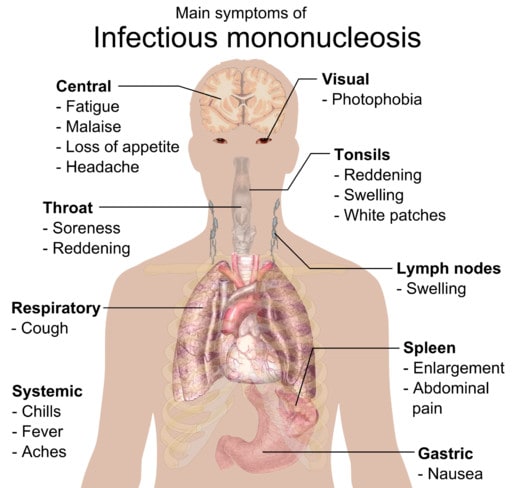Spotting the Signs: A Comprehensive Guide to Glandular Fever Symptoms in Children
Welcome, wonderful parents! Are you worried about glandular fever? Fret not! You’re embarking on an informative journey to recognize the telltale symptoms of glandular fever in children, ensuring your little troopers get the care they need!
What Is Glandular Fever? A Quick Overview
Glandular fever, commonly known as infectious mononucleosis or “mono,” is a viral infection that’s most frequently caused by the Epstein-Barr virus (EBV). It’s super contagious and spreads through saliva—so watch out for those sneaky sips from the same cup or close-up cuddles!
Early Symptoms of Glandular Fever in Kids
Our little ones may not always tell us when they’re feeling under the weather, so it’s up to us, the super-parents, to detect the early signs of glandular fever. Let’s dive into the world of symptoms without further ado!
- Fever: If your child is feeling hotter than a sunny beach day, it could be a fever—one of the prime indicators of glandular fever.
- Sore Throat: Uh-oh, sore throats are as fun as finding a rain cloud on a parade. A persistent sore throat that resists usual treatments can be a red flag for glandular fever.
- Fatigue: Is your usually energetic munchkin now snoozing more than a lazy Sunday afternoon? Glandular fever might be knocking on your door with its characteristic tiredness.
That’s Swell! Understanding Swollen Glands
Glandular fever loves to live up to its name by causing swelling in certain glands. If your child’s neck seems to have built-in pillows (aka swollen lymph nodes), it might be time to think about glandular fever.
Additional Symptoms You Might Notice
Stay on your toes! There are more symptoms that might tip you off to an encounter with glandular fever:
- Loss of Appetite: When your kiddo starts turning down their favorite snacks, it could be a sign that glandular fever has affected their appetite.
- Muscle Aches: If complaints about aches are now part of the daily routine, glandular fever might be the grumpy guest causing discomfort.
- Headache: Persistent headaches can also be a hallmark of this sneaky virus’s presence in your child’s system.
- Skin Rash: Keep an eye out for any unusual rashes that could be glandular fever waving a “hello” flag on your child’s skin.
Remember, every child is unique and may show different signs or a varied intensity of symptoms. It’s important to keep a keen eye on any changes that don’t seem to go away or worsen over time.
When Should You Worry?
Most cases of glandular fever are mild and get better without treatment. But, if your child is experiencing severe symptoms, such as difficulty breathing, intense abdominal pain, or extreme fatigue, it’s time to ring the superhero hotline—aka your family doctor!

Five Things Parents Should Know in Preparing for Symptoms of Glandular Fever
Preparation is key when it comes to managing glandular fever. Here are five essential things every parent should be armed with:
- Understand the Incubation Period: Glandular fever can take 4 to 6 weeks to show symptoms after your child has been infected. So if your child has been exposed, mark your calendar and stay vigilant for any signs that might develop in the coming weeks.
- Hydration is Crucial: Fever can dehydrate our little ones quickly. Ensure they’re sipping on fluids throughout the day. Don’t shy away from offering water, herbal teas, or even tasty broths to keep them hydrated and comforted.
- Comforting the Sore Throat: Stock up on throat lozenges suitable for children, make honey-lemon drinks, and keep a humidifier in the room to ease that scratchy throat. Ice cream or cold popsicles can also be soothing—bonus points for being a cool parent!
- Pain Management: For those achy muscles and headaches, it’s good to have child-friendly pain relief like acetaminophen or ibuprofen on hand. Always follow the advice of a healthcare provider regarding dosages and frequency.
- Create a Cozy Recovery Space: Since rest is paramount, create a comfortable area for your child to recuperate. Soft blankets, a stack of their favorite books or movies, and quiet activities can help them rest and recover in a stress-free environment.
With these preparations in place, you’ll be ready to provide the support and care your child needs should glandular fever come knocking. Keep these tips in your parenting toolbox and face glandular fever with confidence!
See more great Things to Do with Kids in New Zealand here. For more information see here
Disclaimer
The articles available via our website provide general information only and we strongly urge readers to exercise caution and conduct their own thorough research and fact-checking. The information presented should not be taken as absolute truth, and, to the maximum extent permitted by law, we will not be held liable for any inaccuracies or errors in the content. It is essential for individuals to independently verify and validate the information before making any decisions or taking any actions based on the articles.




